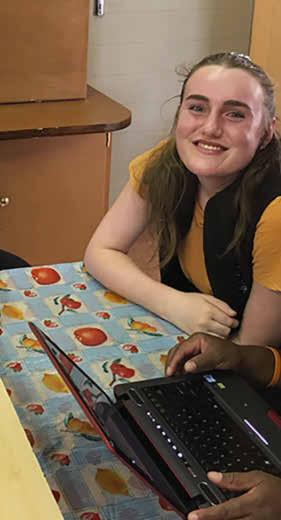
5 minute read
Shelford Girls’ Grammar
Principal Katrina Brennan
With a child-centred philosophy of education, Katrina’s passion for engaging and empowering her students is matched by her deep connection to the Shelford community and respect for the diversity within it. 3 Hood Crescent, Caulfield VIC 3161
Advertisement
With a rich and proud history of educating girls, Shelford Girls’ Grammar is a small, inclusive school with a wonderful sense of community. For 123 years Shelford has been a strong advocate for girls’ education, preparing girls and young women for a complex and changing world.
Our school has an outstanding academic tradition and offers students a range of subjects, right through from Prep to VCE level. Shelford has exceptional Visual and Performing Arts programs, extensive sporting opportunities and a strong cocurricular program including exchanges, camps, debating and a unique Year 9 Challenge program.
Our students flourish because they learn in a community that nurtures, stimulates and challenges them, and in which they are encouraged to be courageous. Our girls are able to explore, be curious and try out new things in a supportive, positive environment, where high standards and the pursuit of excellence are part of the historical fabric of the school.
Exceptional teaching staff who are highly qualified and passionate educators work collaboratively to know and nurture each and every student. ● A wonderful sense of community ● Inclusive, welcoming students from all backgrounds ● Each student is known and valued ● Outstanding academic tradition and excellent VCE results ● Extensive sporting opportunities ● Exceptional Visual and Performing Arts programs
THE BASICS
Enquiries
+61 3 9524 7333 shelford.vic.edu.au information@shelford.vic. edu.au
Years
Prep – Year 12
Denomination
Anglican
Gender Girls only
Fees POA
Boarding \ No
Scholarships \ Yes
RESPECT
Sitting at the core of every interaction at Shelford, students are taught to respect any difference in others, be mindful of the needs of their peers and care for their community through engagement and service.
INTEGRITY
Courteous, reliable, honest, loyal and trustworthy behaviour is encouraged and developed in students. They make ethical and principled decisions for themselves, and our community.
PASSION
Within a culture that fosters a love of learning, Shelford students are given the freedom, courage and confidence to try new things, and encouraged to discover and develop their strengths and interests.
CREATIVITY
Shelford students are taught to embrace the challenges of the 21st century and respond with curiosity, imagination and innovative thinking.
ENGAGING WITH REALWORLD ISSUES
Hands-on programs are opening students’ eyes to real-world issues and setting them up for success.
BY JOANNE BROOKFIELD
RISING TO THE CHALLENGES
Hanging in the corridors of Siena College in Camberwell are various embroidered textiles, handmade by the Kopanang women from Tsakane, South Africa. The Kopanang community project was created to provide these women, many of whom have been impacted by HIV/AIDS and endemic poverty, with the opportunity to learn embroidery and craft skills, which enable them to generate a small income.
“That’s a really important visual reminder to the girls that our community extends to these people,” says Bronwyne Ilott, head of justice education at Siena, a Catholic girls’ school in the Dominican tradition. Each year – in non-COVID times, at least – year 11 students have the opportunity to travel there for one of the school’s two immersion programs. The other is an indigenous immersion program in the Northern Territory, offered to years 9, 10 and 11 students.
“It’s a true immersion in every sense of the word,” says Ilott. “They leave comfortable, suburban Melbourne and they actually go and live in the homes of these women.
“It’s transformative. Girls come back changed in all sorts of ways,” she adds, giving the example of a student who was so moved by developing this new perspective on the world that she went on to study global politics at university and is looking at humanitarian work.
Siena isn’t the only school tackling real-world topics in and outside the classroom by providing their students with experiences and programs that are not only allowing them to address the issues of our times, like social justice and climate change but equipping them with the skills to rise to these challenges as future adults and leaders.
Yarra Valley Grammar, an Anglican co-ed school in Ringwood, embraces a World Religions Week and Diversity Week. “We’ve taken students out of the school to experience a range of cultural and social settings to open their eyes,” says chaplain Paul Joy.
To learn about other beliefs has meant


visits to places of worship from Islamic, Buddhist, Jewish and Catholic faiths.
“A highlight is always the Sikh temple in Blackburn who wouldn’t let us leave without serving us lunch – that’s 150 students all sitting in rows on the floor,” says Joy. Diversity Week has included visits to Chinese, Italian and Hellenic museums and students rolling up their sleeves and pitching in with feeding the elderly, disadvantaged students and the homeless.
Like Siena, which has an Eco Warriors group, formed with students across all year levels as part of its commitment to Sustainable Development Goals (a global agenda, adopted by countries in 2015), Caulfield Grammar School is also encouraging students to learn more about the natural environment and sustainability in a hands-on way at its Yarra Junction campus.
In the mid-1940s, the Cuming family donated 335 acres to the school, and the result was a campus that would “provide students from the city an understanding of rural life in a setting with a strong focus on community living”, explains campus head Tim O’Connor.
“Students are hands-on exploring paddock-to-plate concepts on the dairy farm, in the veggie garden and in the kitchen,” he says. “They are accommodated in purpose-built ecocabins that allow them to monitor their energy use. These things combine to encourage students to consider how our lifestyle choices can impact the world around us.
The benefits of this type of learning are transferable skills, like communication, negotiation, ownership and empathy, which apply beyond adolescence.
‘[Students] leave
BRONWYNE ILOTT






